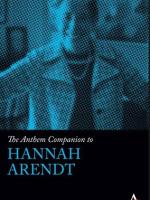The idea of dehumanization in genocide
A new book explores the complicated relationship between Hannah Arendt and the social sciences. Arendt was a determined critic of the social sciences, yet over the last couple of decades, her work has become increasingly important to social-scientific thinking. As the editors note, Arendt’s renewed relevance owes much to the emergence of “genocidal movements in Africa, the Balkans and the Middle East and, with them, new forms of ideology and terror; the implosion of nations and the tragic reemergence of stateless peoples; the growth of human rights discourses […]; renewed disquiet over the reach of the state and its encroachments on privacy; the recovery of classical republicanism as a political alternative to liberalism and socialism. All these developments evoke Arendtian concerns and arguments.”
In one chapter of the book, senior researcher Johannes Lang sheds new light on Arendt’s relation to the social sciences by identifying the elements in her thought that reappear in sociological and social-psychological theories of genocide and mass atrocity. One Arendtian claim, now often taken for granted by historians and social scientists, is that “dehumanization” is a necessary component of such violence. Scholars routinely describe the perpetrators as “inhuman” and argue that the diminishment of the victims’ human status is a precondition for their destruction. Lang’s chapter engages critically with Arendt’s and the social sciences’ multifaceted conception of dehumanization, and questions both the assumptions, the effects, and the persuasiveness of this concept.DIIS Experts


